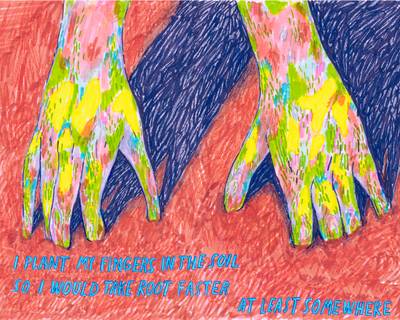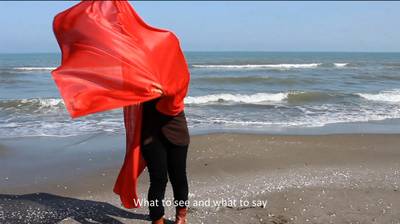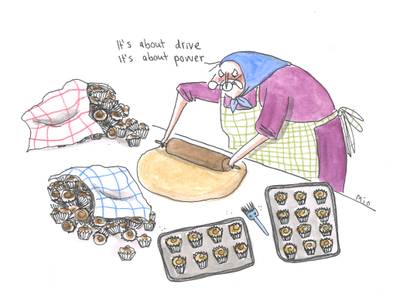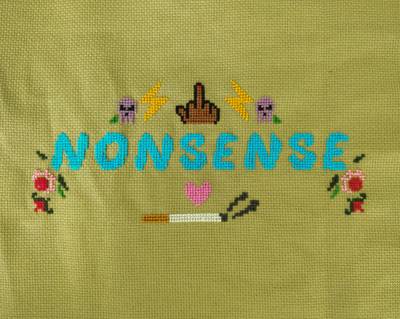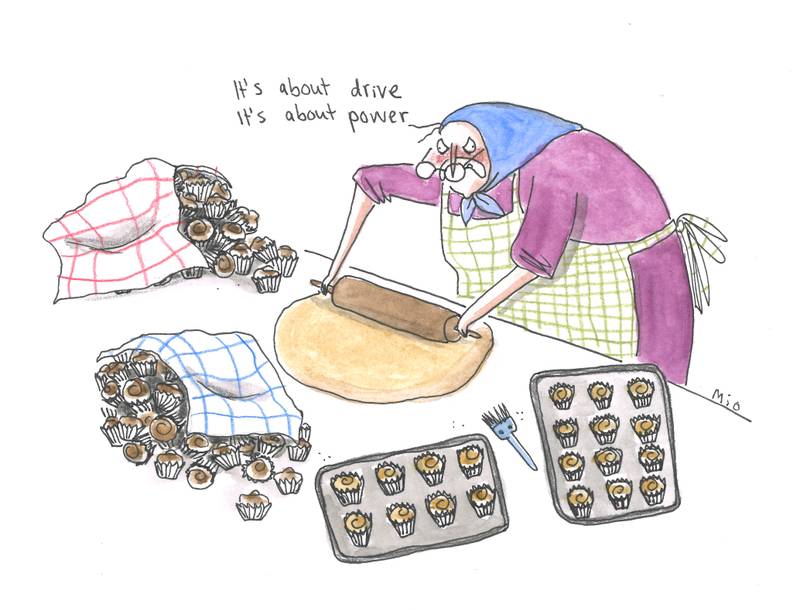

Elham Rahmati (b. 1989, Tehran) is a visual artist and curator based in Helsinki. She is the co-founder and co-editor of NO NIIN. In 2019 and 2020, she worked as the curator and producer of the Academy of Moving People & Images (AMPI), a film school in Helsinki for mobile people.
Vidha Saumya (b. 1984, Patna) is a Helsinki-based artist-poet. She is the co-founder and co-editor of NO NIIN – an online monthly magazine in Finland, and a founding member of the Museum of Impossible Forms – an award-winning cultural para-institution in Kontula, Finland.
It’s about power! It’s about drive!
Elham Rahmati
I entered 2022 in a state of total bliss. I was in Tehran, surrounded by family and friends, and waiting for my baby nephew to be born. I spent the next two months happier than I had ever been in the previous years. The closer I got to my return date to Finland, the more anxious I became. The feeling was not entirely Finland’s fault, it also had to do with everything happening in Finland’s vicinity: the Russian invasion of Ukraine.
While the conversations around me in Tehran revolved around what this war means for Iran and the ongoing negotiations with the US to reach yet another deal–that they most likely will bow out of in a few years–in Europe, people were left in shock of “How could this happen so close to us? Isn’t war something just for the non-whites of the world?”. I don’t want to get into the Western sham of solidarity— write solidarity, read hypocrisy—made even more apparent by the Russian attack. The Western sense of superiority over all other beings in the universe isn’t something that needs further “unfolding” or “unearthing”. I don’t want to get into the deep-seated anger I felt when I saw all the Finnish art and culture institutions that we have been urging for months to extend solidarity to the Palestinian struggle for decolonisation publicly and to participate in the boycott, divestment, and sanctions (BDS) movement1, have not wasted one moment in issuing solidarity statements for Ukraine and halting collaborations with Russia. Mohammed El-Kurd was on point when he wrote, “Hypocrisy” doesn’t describe this adequately. The appropriate word is psychosis."2
Soon after the start of the attack, I witnessed a flood of public demands among the “progressive” art communities I know and happen to respect, asking their governments to issue sanctions on Russia. I heard about OP bank suspending the accounts of Russian people residing in Finland3. This was followed by the news of the Finnish Film Foundation halting all collaborations with Russia4. Now, sanctions are something we Iranians—along with Cubans, Iraqis, Venezuelans, etc.—have lived with for many years and, in our right minds, don’t wish them upon any other people, so I thought I’d use my tiny little platform to at least make sure those close to me know what it is that, in their moment of fear, they are advocating for. I wanted them to know “sanctions are an act of warfare – economic, to be sure, but warfare nevertheless”5. After a few conversations, it was clear to me that nobody really seems to know what they’re pushing for entails: economically strangling ordinary people that are already oppressed by an authoritarian state; strengthening the state’s grip on power and the economy; causing a massive surge in corruption and inequality; brutally isolating the ordinary people from the Western world and its mainly stolen resources. It seems all the academic degrees in the world can’t help our lovely “progressives” get a grasp on imperialism and colonialism and the many cunning forms they may take.
I got many triggering “But, what’s the alternative?” questions. I’m telling you that the answer to killing innocent people is not to kill other innocent people, and you ask me about alternatives. As you can see, white people in panic mode are not exactly the best argument-holders. Some of them also tend to try and indirectly school you and tell you how to behave. I had to stop myself from telling them, “Oh dear, don’t you know that moral superiority is not something you can afford?”
This is a tragedy that is happening not to you but near you. You may not be blessed by the moral superiority that you so weirdly crave; instead, you are blessed by time and infinite resources at your disposal to learn and educate yourself so that in the moments of panic, you don’t cling to the first worn-out solution you come across. It is then that you can hold your representatives accountable and demand them to do better, to come up with solutions that don’t kill innocent people, wherever they may be.
Sanctions, economic or cultural, have a failed history. We all want to be “doing something,” but doing something to whom? That’s an essential question to keep in mind. If your first response as an art institution is to issue punitive actions that harm artists from your neighbouring country, the same artists that are now in their streets protesting the war, getting arrested and jailed for it, then you have failed to understand the ABCs of what your job first and foremost is: supporting artists—calling for peace and solidarity instead of adopting right-wing jingoism into your working ethos. If you are an art worker in Europe, watching these responses and opting to stay silent or worse, support these institutions, then please, for the love of god, take my sisterly advice and do the following: Don’t hold another workshop/exhibition on care, friendship, love, hospitality, accountability, transparency and diversity. These are things that must be extended to all people, not just the ones who look like you. Later, take a long pause and revisit the real so-called European values your governments want so badly for the rest of the world to adopt. Chances are you are not going to like them.
PS. I bought this sweet artwork from Mio Norrman, an artist I’ve discovered through Instagram. It’s an illustration of an old woman hysterically baking a ton of cinnamon buns and saying to herself, “It’s about power! It’s about drive”. I can see myself in my 70s baking muffins (I don’t like cinnamon buns) and frantically preaching to everyone (in my 70s I’ll be too tired to get into an online debate) and reminding them, “IT’S ALL ABOUT POWER!”
To understand how sanctions function as a war-making strategy you can read the following links:
- Sanctions Are an Act of War: A Q&A about Economic Sanctions
- A Peaceful, Silent, Deadly Remedy: The Ethics of Economic Sanctions
- U.S. Sanctions Are Killing Cancer Patients in Iran
- Our Daily Sanction
- The Invisibility of Human Harm: How Smart Sanctions Consumed All the Oxygen in the Room
- Thanks to US Sanctions, Afghans Are Starving
- Solidarity With Ukraine Doesn’t Mean Calling for More War
- The Economic Weapon
COMING SOON: Life Plans Unfolding
Vidha Saumya
T wants to divest herself of the planning mode and enjoy the present. Sitting with her sister, both cross stitching while chuckling away at the dramatic characters of the 50 episode drama on OTT platforms, munching on banana chips = those were the dream days: days when work had already been attended to (or forgotten about). She greedily awaits those days when image-making would be as automatic as laughing and being with whom you love. And yet, working and making plans for the magazine is a different kind of autopiloting. Each time she launches a new issue with her working partner, she is thrilled at the collective effort of contributors, editing processes, and the agility of the website developer as he swiftly uploads the most challenging image-text combinations. Automatic!
T is a compulsive planner. Through its up-down undulations, the journey of ‘planning’ has pull-buoyed T through work-life difficulties and has even intermittently allowed her to starfish her arms into floaty bliss. As many life coaches and influencers will tell you, planning the day gives a sense of rhythm and an overall understanding of how the day will unfold. After all, what you do each day becomes your life. There is, however, some unrest at the moment in this life; T is in her late 30s and is figuring out how to make unconventional choices, exercise, drink more water and be spontaneous. She is also trying to be the kind of artist-poet-embroiderer, who draws habitually, writes deftly, shares her ongoing projects on social media, updates herself on fashion trends, experiments with make-up and organises her life around work deadlines. What demands on her SMART planning chops! Her life coach vocabulary is up to date, but it does little to invigorate and motivate her. She finds herself susceptible to the comforts of “practicality”. She desires ambition, experimentation, and freedom - a complete opposite of practicality and planning.
Planning is a largely invented process, albeit faithful to one’s desires and habits. The modern-day planner is a cyborg who can look back and forth through the lens of advancing technology with the help of new apps and networked channels. Some may even wonder, what can the planner do if there isn’t an app for it? T as a planner is doing, analysing what has been done, and using all of it as a film reel to project onto the fabric screen of future life. She hopes it will reveal passions and interests that were previously unknown. She found it easy to think of planning in analog terms. Unlike the possibility of a quick replay of a video recorded on the phone and sped up or slowed down and combined with effects and sound scores, the scratches, mismatching, background disturbances, rewarding coincidences, the unexpected play of light shall only appear upon developing the film. How can she keep finding new ways to create an environment where work does not appear to be a difficult promise to keep but rather an easy companionship? In search of this answer, T steers clear of the distraction of impatience. But her planner mind is easily distracted, collecting as many odd jobs and changing preferences because planning for the worst often seems to be the best way to move forward. It’s challenging to remain collected.
Despite the perceived serenity and auto-anthropological stance, T doesn’t know when to tell her colleagues that she doesn’t know if she can commit to a future project because she doesn’t know her residence status. She’s now kind of okay living with the permanent sense of having to leave and start anew. To make it light, she jokes that every third conversation between two immigrants in Finland is about their residence permit status. Who can define the plans, desires and dreams of those who live with a permanent sense of imminent departure? These transient stays made possible through yearly permits could be compared to summer flowers arranged by the city at Metro station entrances between June to September - offering saturated delight in the summer months.
When T and her partner D had written the proposal for a new project, they had concrete ideas, a practical plan, and a decent budget proposal. Upon receiving the grant, they carried the plan out verbatim. Working head-on for a project made T realize how important it is to put energy into the plan now; this is not to say that one does not make room for the unexpected. Life unfolds with the consequences of choices made by the two of them. They work with determination and unfailing optimism in a scene that is yet to acknowledge what they are doing. The days they make multiple creative decisions seem rewarding, while other days are rendered tedious, packed with follow-ups and administrative work.
T thinks to herself, is this something that I wanted to do? She doesn’t have anyone to complain to after all. She is working on something that she and her working partner had desired for a long time, made a plan for, and have worked immensely towards publishing it in the most comfortable way possible. There are days where the work feels automatic, and there are days when each effort feels like a deliberate push against what the mind is telling you to do. The dull uniformity in the processes can sometimes feel crushing. The self desires to slip beneath the surface and disappear into doing something else altogether, like looking for perfect office furniture. D excitedly asks can we buy these chairs, just these and a table? T resists, saying, it’s beautiful and all, but won’t it get sweaty, it’s upholstered with artificial fabric? D insists, these are between a sofa and a chair, and don’t look boring, and then we’ll get a rug and a couple of stools and frames, and it will look beautiful.
T knows she is easily overwhelmed by spontaneity, blanks out, and tightly leans on the most practical aspect of the decision to be made. That which is not in the plan throws her off. She remembers that during her most recent visit to Bombay, T’s mother had asked so, what plans do you have for the future? Firmly and gently, T replied I could not have imagined where I am today five years ago, so I would like to take some time to revel - content and satisfied. Mother had smiled.
Ten minutes later, T texted D back, let’s check the piece. It really looks great, and we get the legs of the table painted in the same colour or turquoise.
